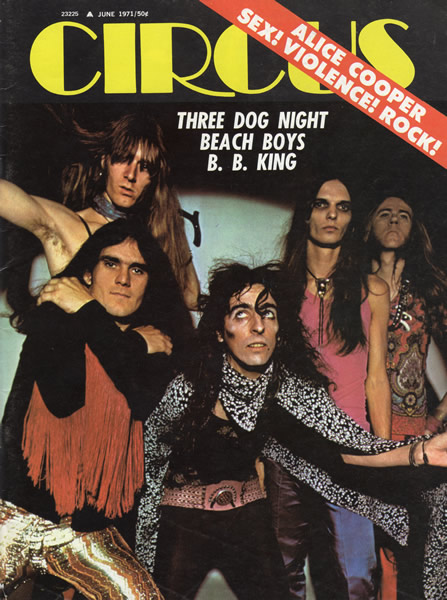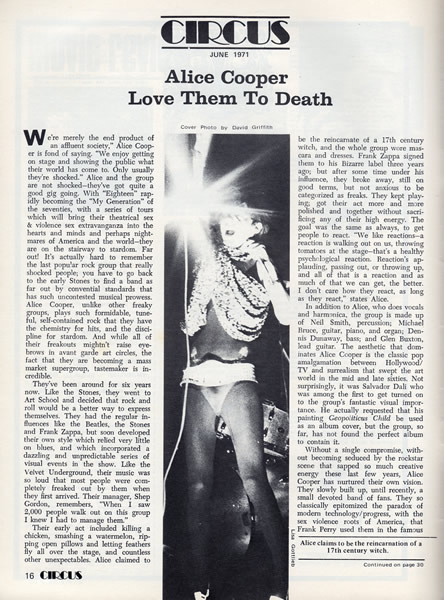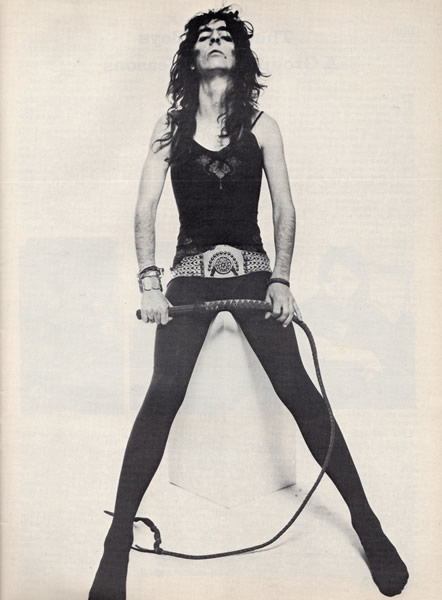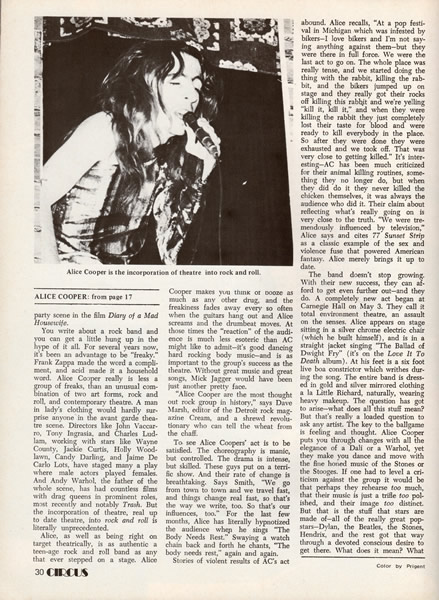Article Database
Alice Cooper - Love Them To Death
"We're merely the end product of an affluent society," Alice Cooper is fond of saying. "We enjoy getting on stage and showing the public what their world has come to. Only usually they're shocked." Alice and the group are not shocked - they've got quite a good gig going. With "Eighteen" rapidly becoming the "My Generation" of the seventies, with a series of tours which will bring their theatrical sex & violence sex extravanganza into the hearts and mind and perhaps nightmares of America and the world - they are on the stairway to stardom. Far out! It's hard to remember the last popular rock group that really shocked people; you have to go back to the early Stones to find a band as far out by conventional standards that has such contested musical prowess. Alice Cooper, unlike other freaky groups, plays such formidable, tuneful, self-contained rock that they have the chemistry for hits, and the discipline for stardom. And while all of their freakouts mightn't raise eyebrows in avant garde art circles, the fact that they are becoming a mass market supergroup, tastemaker is incredible.
They've been around for six years now. Like the Stones, they went to Art School and decided that rock and roll would be a better way to express themselves. They had the regular influences like the Beatles, the Stones and Frank Zappa, but soon developed their own style which relied very little on blues, and which incorporated a dazzling and unpredicatible series of visual events in the show. Like the Velvet Underground, their music was so loud that most people were completely freaked out by them when they first arrived. Their manager, Shep Gordon, remembers, "When I saw 2,000 people walk out on this group I knew I had to manage them."
Their early act included killing a chicken, smashing watermelon, ripping open pillows and letting feathers fly all over the stage, and countless other unexpectables. Alice claimed to be the reincarnate of a 17th century witch, and the whole group wore mascara and dresses. Frank Zappa signed them to his Bizarre label three years ago; but after some time under his influence, they broke away, still on good terms, but not anxious to be categorized as freaks. They kept playing; got their act more and more polished and together without sacrificing any of their high energy. The goal was the same as always, to get people to react. "We like reactions - a reaction is walking out on us, throwing tomatoes at the stage - that's a healthy psychological reaction. Reaction's applauding, passing out, or throwing up, and all of that is a reaction and as much of that we can get, the better. I don't care how they react, as long as they react," states Alice.
In addition to Alice, who does vocals and harmonica, the group is made up of Neal Smith, percussion; Michael Bruce, guitar, piano, and organ; Dennis Dunaway, bass; and Glen Buxton, lead guitar. The aesthetic that dominates Alice Cooper is the classic pop amalgation between Hollywood/TV and surrealism that swept the art world in the mid and late sixties. Not surprisingly, it was Salvador Dali who was among the first to get turned on to the group's fantastic visual importance. He actually requested that his painting Geopoliticus Child be used as an album cover, but the group, so far, has not found the perfect album to contain it.
Without a single compromise, without becoming seduced by the rockstar scene that sapped so much creative energy these last few years, Alice Cooper has nurtured his own vision. They slowly built up, until recently, a small devoted band of fans. They so classically epitomized the paradox of modern technology/progress, with the sex violence roots of America, that Frank Perry used them in the famous party scene in the film Diary of a Mad Housewife.
You write about a rock band and you can get a little hung up in the hype of it all. For several years now, it's been an advantage to be "freaky." Frank Zappa made the word a compliment, and acid made it a household word. Alice Cooper really is less a group of freaks, than an unusual combination of two art forms, rock and roll, and contemporary theatre. A man in lady's clothing could hardly surprise anyone in the avant garde theatre scene. Directors like John Vaccarro, Tony Ingrasia, and Charles Ludlam, working with stars like Wayne County, Jackie Curtis, Holly Woodlawn, Candy Darling, and Jaime De Carlo Lots, have staged many a play where male actors played females. And Andy Warhol, the father of the whole scene, has had countless films with drag queens in prominent roles, most recently and notably Trash. But the incorporation of theatre, real up to date theatre, into rock and roll is literally unprecedented.
Alice, as well as being right on target theatrically, is as authenic a teen-age rock and roll band as any that ever stepped on a stage. Alice Cooper makes you think of booze as much as any other drug, and the freakiness fades away every so often when the guitars hang out and Alice screams and the drumbeat moves. At those times the "reaction" of the audience is much less esoteric than AC might like to admit - it's good dancing hard rocking body music - and is as important to the group's success as the theatre. Without great music and great songs, Mick Jagger would have been just another pretty face.
"Alice Cooper are the most thought out rock group in history," says Dave Marsh, editor of Detroit rock magazine Cream, and a shrewd revolutionary who can tell the wheat from the chaff.
To see Alice Coopers' act is to be satisfied. The choreography is manic, but controlled. The drama is intense, but skilled. These guys put on a terrific show. And their rate of change is breathtaking. Says Smith, "We go from town to town and we travel fast, and things change real fast, so that's the way we write, too. So that's our influences, too." For the last few months, Alice has literally hypnotized the audience when he sings "The Body Needs Rest." Swaying a watch chain back and forth he chants, "The body needs rest," again and again.
Stories of violent results of AC's act abound. Alice recalls, "At a pop festival in Michigan which was infested with bikers - I love bikers and I'm not saying anything against them - but they were in full force. We were the last act to go on. The whole place was really tense, and we started doing the thing with the rabbit, killing the rabbit, and the bikers jumped up on stage and they really got their rocks off killing this rabbit and we're yelling "kill it, kill it," and when they were killing the rabbit they just completely lost their taste for blood and were ready to kill everybody in the place. So after they were done they were exhausted and we took off. That was very close to getting killed." It's interesting - AC has been criticized for their animal killing routines, something they no longer do, but when they did do it they never killed the chicken themselves, it was always the audience who did it. Their claim about reflecting what's really going on is very close to the truth. "We were tremendously influenced by television," Alice says and cites 77 Sunset Strip as a classic example of the sex and violence fuse that powered American fantasy. Alice merely brings it up to date.
The band doesn't stop growing. With their new success, they can afford to get even further out - and they do. A completely new act began at Carnegie Hall on May 3. They call it total environment theatre, and assult on the senses. Alice appears onstage sitting in a silver chrome electric chair (which he built himself), and is in a straight jacket singing "The Ballad of Dwight Fry" (it's on the Love It To Death album). At his feet is a six foot live boa constrictor which writhes during the song. The entire band is dressed in gold and silver mirrored clothing a la Little Richard, naturally, wearing heavy makeup. The question has got to arise - what does all this stuff mean? But that's really a loaded question to ask any artist. The key to the ballgame is feeling and thought. Alice Cooper puts you through changes with all the elegance of a Dali or a Warhol, yet they make you dance and move with the fine honed music of the Stones or the Stooges. If one had to level a criticism against the group it would be that perhaps they rehearse too much, that their music is just a trifle too polished, and their image too distinct. But that is the stuff stars are made of - all of the really great popstars - Dylan, the Beatles, the Stones, Hendrix, and the rest got that way through a devoted conscious desire to get there. What does it mean? What did "I Am A Walrus" mean - what did Highway 61 mean? What did long hair mean? Alice Cooper will be travelling with a fifty foot by twenty foot dome.
The final thing about Alice Cooper, the most obvious thing and the most difficult to discuss is their sexuality. Like the Stooges they are beneficiaries of the sexual liberation that the Stones gave us. AC: "It's not an anti-sex trip. Like we're taking sex which is probably half of American entertainment, sex and violence, and we're saying this is the way everything is right now. This is the way we are. Biologically, everyone is male and female, so many male genes and so many female. And so what it is is we're saying, 'OK, what's the big deal? Why is everybody so uptight about sex? About faggots, queers, things like that. That's like making fun of a maniac because his brain isn't completely right, because he isn't in the norm. People don't accept that they're both male and female and people are afraid to break out of their sex thing because that's making them accept more, making it fun that we accept that. The thing is - this is the way we are - we think it's a gas." And like most of what AC says, it seems to come frrom an authentic place of non-attactment. It's very hard to tell with popstars, you often wonder if they mean what they say or if it's merely part of a master plan in their head to make a fortune. But Alice Cooper, as much as anyone can, is talking from what he feels.
"People ask us sometimes," remarks Smith, " 'Is this a put-on or what?' and it's not. This is the way we are." The idea that much of rock music has dealt with is freedom - freedom from inner slaveries. The freer you get, the less attachments you have. If you are free from the desire for money, you can make money or not make money, but you can be content either way. The same goes for sex, status, physical strength, and food. If you shock people or repel them, you have touched on an attachment, a prejudice which is limiting their freedom." For the time being at least, Alice Cooper's rock perceptions on the cosmos continue to be socially significant.
The seventies got off to a rather slow start. Perhaps it was the Republican administration - or maybe just the rhythm of the times. Until now, most of the seventies superstars were playing sixties music. But Alice Cooper isn't looking back - only in. And as they travel around the country with their boa constrictor, their twenty by fifty dome, and their million dollar records, they are likely to blow quite a few minds, and carve a righteous piece of history that will make some seventeenth century witch out there very proud.








